24/7 Helpline:
(866) 899-221924/7 Helpline:
(866) 899-2219
Other Insurance Options

CareFirst

Health Partners

Cigna

Anthem

Covered California

Ambetter

Magellan

Coventry Health Care

Private insurance

GEHA

Absolute Total Care

Amerigroup

State Farm

Medical Mutual of Ohio

Oxford

Highmark

American Behavioral

Health Net

Premera

Sutter













































































